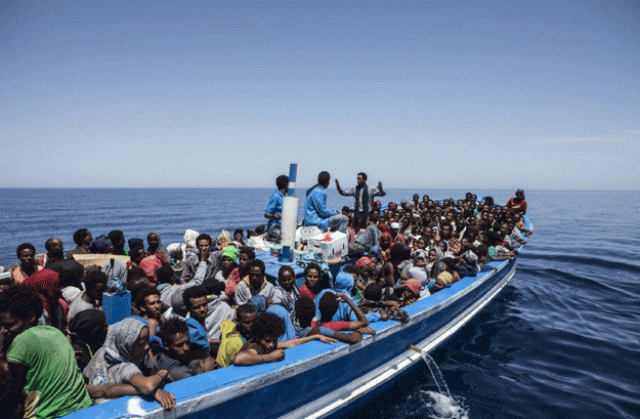Record 137,000 refugees, migrants crossed Mediterranean this year: UN
Refugees arrive in Italy and Greece before moving on to other northern European states in the hope of finding jobs

Refugees arrive in Italy and Greece before moving on to other northern European states in the hope of finding jobs PHOTO: AFP
"Europe is living through a maritime refugee crisis of historic proportions," the UN refugee agency warned in a report.
The numbers flooding across the Mediterranean, often in rickety boats and at the mercy of human traffickers, have swelled 83 percent compared to the first six months of 2014, when 75,000 people made the journey, it said.
The situation is expected to deteriorate further as more clement summer weather allows ruthless people smugglers to dispatch more people.
Arrivals in the second half of 2014 were for instance nearly double those of the first half, UNHCR pointed out.
The immigration crisis is a burning issue for the EU, where member states have been wrangling over the best ways to tackle human trafficking and arguing over how to share the burden of helping new arrivals, many of them ill, starving and destitute.
Read: UNHCR chief praises K-P govt for hosting Afghan refugees
The soaring numbers arriving in Italy and Greece, before moving on to other northern European states in the hope of finding jobs, has sparked outcry and growing anti-foreigner rhetoric in many countries.
The report hailed Brussel's decision to distribute 40,000 Syrian and Eritrean asylum-seekers who have already arrived in Europe among EU members but called for greater solidarity between countries -- to help both the migrants and the states worst affected by the crisis.
UN refugee chief Antonio Guterres stressed most of those attempting the dangerous journey across the Mediterranean are not economic migrants.
"Most of the people arriving by sea in Europe are refugees, seeking protection from war and persecution," he said in a statement.
A third of those who have arrived by sea in Italy or Greece this year came from war-ravaged Syria, while people fleeing violence in Afghanistan and Eritrea's repressive regime each made up 12 percent of arrivals.
Other top countries of origin include conflict-wracked Somalia, Nigeria, Iraq and Sudan, the report said.
This year has also seen a sharp increase in the numbers of people dying as they try to cross the Mediterranean. So far 1,867 have been killed -- 1,308 of them in April alone.
The unprecedented number of deaths that month spurred European leaders to significantly broaden search and rescue operations in the Mediterranean, cutting fatalities to 68 in May and 12 in June.
"With the right policy, backed by an effective operational response, it is possible to save more lives at sea," Guterres said.
Read: Hearth-less: Plight of refugees re-examined
Still, "for the thousands of refugees and migrants who continue to cross the Mediterranean every week, the risk remains very real," he added.
Many of those fleeing to Europe first seek safety in overburdened neighbouring countries such as Lebanon, where a quarter of inhabitants are now Syrian refugees, the report said.
The UN also noted a shift in migration patterns, with the number of people travelling the eastern Mediterranean route from Turkey to Greece now surpassing the route from north Africa to Italy.
Italy, which last year had 170,000 people land on its shores -- more than three quarters of all maritime arrivals in Europe -- saw that slump in the first half of 2015 to 67,500.
In Greece, however, arrivals have more than doubled to 68,000 so far this year compared to 43,500 in all of 2014, the report said.
Greece has fewer than 2,000 reception places, and many refugees and migrants push on, aiming often for northern and Western Europe, particularly Sweden and Germany, which are seen as offering better protection and support.
But getting there often requires a long and dangerous journey, often at the hands of smugglers who route migrants through the Balkans and onwards through Hungary.
Every day, an average of 1,000 people enter Macedonia from Greece, up from 200 just a few weeks ago, UNHCR said.
Broad European cooperation is needed to face the challenge, the report said, warning that controversial anti-migration policies like Hungary's planned four-metre (13-foot) high border fence, will not halt the influx.
"In times of conflict, fences and borders will not stop people fleeing for their lives," the report said.



















COMMENTS
Comments are moderated and generally will be posted if they are on-topic and not abusive.
For more information, please see our Comments FAQ